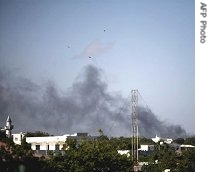2007年VOA标准英语-Somalis, Aid Groups Count Casualties in Recent(在线收听)
Nairobi
10 April 2007
Aid agencies and Somali elders are coming to terms with the after-effects of recent violence in Somalia's capital that has been described as the worst fighting since civil war broke out in 1991. Cathy Majtenyi reports for VOA from Nairobi.
 |
| Smoke is seen on a general view of Mogadishu during heavy fightings in the city, 21 Mar 2007 |
The battle was between Somali government and Ethiopian troops on the one side and insurgents and clan members on the other.
Caught in the crossfire were civilians, including small children.
Many of those who survived the fighting fled Mogadishu. The U.N. refugee agency estimates that 124,000 people left Mogadishu since February.
U.N. refugee agency spokeswoman Millicent Mutuli tells VOA that many of those who fled are now facing extreme hardships on the run in different parts of Somalia.
"People basically do not have assistance," she said. "Humanitarian agencies are not present in these areas. People are basically left to their own devices for the last couple of weeks. There are reports of illness, there were reports of diarrhea because people do not have access to clean drinking water."
Mutuli says complicating the peoples' plight is the closure of the Kenyan border, which means those on the run do not have access to assistance such as food and shelter at refugee camps in Kenya.
It is difficult to assess the exact damage of the fighting. While the elders give a death toll of more than 1,000, the Somali aid group Center for Peace and Democracy says that some 540 people were killed primarily by gunfire and artillery shelling. The group estimates that more than 1,000 were injured.
The elders say more than 4,300 people were injured during the fighting and that damage to property was about $1.5 billion.
Ethiopian troops came to Somalia at the end of last year to help the interim government oust the Islamic Courts Union, which had taken control over Mogadishu and much of southern Somalia.
Although the Islamists eventually were defeated, the Ethiopian troops still remained in Somalia. Insurgents have been attacking the troops and Ugandan soldiers stationed in Mogadishu as part of the African Union's peacekeeping mission.
Since Somalia's civil war broke out in 1991, militias loyal to clan and sub-clan-based factions have controlled different parts of the country, with no central authority to provide law and order or basic services to the population.
A transitional Somali parliament was formed in Kenya more than two years ago, following a regionally led peace process.